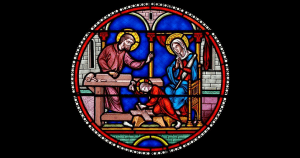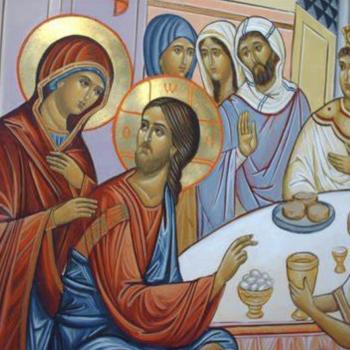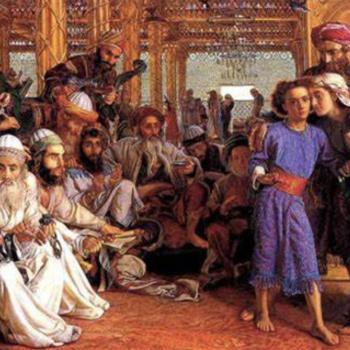Naming names: St. Joseph did it and so do monks.
I am a monk in the Order of St. Benedict.
My monastery keeps the tradition of our superior, the abbot (from a Biblical word for a father), bestowing a new name on a man after he enters and makes vows.
This name change is a sign of being born into the monastic family, starting a new life and mission to follow the teachings of St. Benedict.
Benedict wrote a rulebook spelling out the disciplines of monastery life.
Beyond working, eating and sleeping, Benedict wove the monastery’s day around two religious or devotional practices: the Divine Office (or Liturgy of the Hours) and lectio divina.
The Divine Office (which all the world’s clergy and religious orders fulfill in some form) takes place several times a day in the monastery’s oratory, with the whole community of monks together voicing aloud Psalms and readings from the Bible and Church writers.
Lectio divina, “divine reading” or “divine lesson,” is an individual pursuit of each monk: for about three hours daily, he reads whatever he wants from the Bible with attentiveness and prayerful reflection. [This discipline deserves its own article, and there are many such online, though the best overall piece on it is Casey’s book, “Sacred Reading: The Ancient Art of Lectio Divina.”]
That’s it for us Benedictine monks: the Divine Office and lectio divina.
We can stick to that austere regime, freeing us to mine it as deeply as possible, and we have no obligation to add anything else, such as Eucharistic Adoration, the rosary, other devotional prayers, or devotion to the saints.
So, I don’t have a particular devotion to St. Joseph.
Thus, writing this article on Joseph is an interesting, unusual and challenging project for me personally.
It will involve me in lectio divina of the Gospel texts regarding Joseph.
A monastery’s abbot, in bestowing a name on a new monk, follows Biblical traditions that include St. Joseph who, as the Virgin Mary’s husband, was entitled to bestow a name on her child.
In the Bible, bestowing names is a godlike prerogative.
In creating the beasts in the beginning to serve as companions for the first man, God did not name the beasts, but had the man do so.
As for that man, he’s first just called in Hebrew an adam, a man, though later the word is taken to be his personal name, Adam.
A Biblical man did not have a last name in the same way we do today.
He went by his personal name, and, if further identification was necessary, he added the name of his hometown, of his father or of both hometown and father.
Just so, John 1:45 reports that shortly after Jesus began his ministry:
Philip found Nathanael, and said to him, “We have found him of whom Moses in the law and also the prophets wrote, Jesus of Nazareth, the son of Joseph.
That is the last Gospel mention of St. Joseph, but it does not tell us whether he was already dead at the time or still alive.
Luke 3:23 similarly identifies Jesus shortly after he began his ministry:
Jesus, when he began his ministry, was about thirty years of age, being the son (as was supposed) of Joseph, the son of Heli.
“Jesus the son of Joseph”— transcribing the original Hebrew of that name into English gives us Yehoshua (or Yeshua) Ben-Yosef.
Luke’s Gospel says Joseph was the son of Heli, while Matthew’s Gospel identifies Joseph’s father as Jacob.
Today, English and other languages have surnames, last names, family names that are patronymics, that is, names derived from a father or ancestor, for example, Anderson, Johnson, Robinson and others.
And so, we can give Jesus a patronymic, Jesus Josephson, even though Joseph Jacobson (a.k.a. Joseph Helison) did not beget Jesus Josephson biologically.
For, as we profess in the Creed at Mass, the one Lord Jesus Christ, the Only Begotten Son of God, born of the Father before all ages … came down from heaven, and by the Holy Spirit was incarnate of the Virgin Mary, and became man.
Nonetheless, the Gospel texts acknowledge Joseph as having lived and served as the father of Jesus.
From Luke 2:51-52, we understand that the boy Jesus obeyed Joseph as his father and that Joseph favored Jesus increasingly.
Jesus went down with his parents and came to Nazareth, and was obedient to them. His mother kept all these things in her heart. Jesus increased in wisdom, in stature and in favor with God and man.
From one incident in the Gospels, we can draw out that Jesus honored and loved Joseph, and that Jesus regarded lovingly those who honored and loved their own fathers.
A man asked Jesus what he must do to inherit eternal life. Jesus told him to keep the commandments, to honor his father and mother, to love them and all his fellow men and women as he loved himself. The man told Jesus that was how he had lived from his youth. Jesus, looking upon the man, loved him. [Compiled from Mt. 19:16-20, Mk. 10:17-21 and Lk. 18:18-21]
With faith in the teaching and integrity of Jesus, we can gather that he honored his father Joseph and loved him.
For his part, Joseph had adopted Jesus as his own son.
God sent an angelic messenger to Mary and also to Joseph, telling them both to give Mary’s son the name Jesus.
But the naming of the boy at his circumcision ceremony when he was eight days old belonged to the boy’s father, not his mother.
The Biblical role of bestowing names belonged to God, to one’s king or to one’s father.
For example, since John the Baptist was born while his father Zechariah was mute, his mother spoke the name John.
But since no one would accept that from her, mute Zechariah, exerting his role as the child’s father, wrote out the name John.
Likewise, Joseph bestowed the name of Jesus on Mary’s son, thus stepping forward publicly and Biblically as the father of Jesus.
Though the Gospels do not quote a single utterance of Joseph, we can be sure he uttered formally the name of Jesus when the child was eight days old.
Jesus, Yeshua, Yehoshua: meaning the Lord Is Savior, or the Lord Is Salvation.
The proclamation of that name was the one-word Holy Gospel According to Joseph, binding that name to the boy, binding the boy to that name, and binding Joseph to be the boy’s father.
If Joseph had refused to bestow a name on the boy, it would have amounted to vowing that he was not the boy’s father and that Mary had conceived the child through adultery, thus bringing her to death by stoning.
But Joseph, in naming Jesus, did more than save Mary’s face and life.
In ritually and publicly naming the name of Jesus, Joseph began what was tantamount to the proclamation of the Gospel of the Lord.
Joseph was in a sense the first evangelist.
Jesus, Yeshua, Yehoshua: the Lord Is Savior, or the Lord Is Salvation.
Imagine the following at a liturgy— monastic or otherwise.
“The Lord be with you.”
And with your spirit.
“A reading from the holy Gospel according to Joseph.”
Glory to you, O Lord.
“The Lord is Salvation.”
“The Gospel of the Lord.”
Praise to you, Lord Jesus Christ.
Joseph bestowing the name of Jesus, The Lord Is Salvation, was naming him to his mission of being both Lord and Salvation of humankind.
But Joseph did much more.
He rushed Jesus out of the land and into Egypt to protect him from the murderous ambition of King Herod.
Thus Joseph was savior of the Savior.
Joseph raised a son, Jesus.
As an adult Jewish man, Joseph had the duty to go on pilgrimage to Jerusalem on three yearly festivals: Passover, Shavuoth and Succoth.
The Gospel says he and Mary went to Jerusalem at Passover every year, and it describes what happened there when the boy Jesus was twelve.
Joseph had the duty to teach Jesus the obligations binding Jewish men when they reached their twentieth birthday: to be ready to go to war if God called for it, to pay a half shekel yearly for the supplies and upkeep of the Jerusalem Temple, to work to raise or buy an unblemished male lamb for Passover, to obey God’s commandments, etc.
Joseph raised his son Jesus for Jewish manhood.
Although Jesus is God the Son of God the Father, there is nothing in the Gospels or our Christian faith to justify excluding Joseph from having left a deep mark on Jesus by raising him as his own son.
Humanly speaking, where did Jesus learn or acquire what he taught?
Besides his own human openness to God the Father and God the Holy Spirit, besides his own human study of God’s word in the Jewish scriptures, besides his own human prayer, worship and meditation, Jesus undoubtedly discussed with Joseph the mysteries of God, especially as God had intervened in Joseph’s life and even in Joseph’s dreams.
People stunned to hear the teaching of Jesus wondered where he got his wisdom.
Coming to his own country Jesus taught them in their synagogue, so that they were astonished, and said, “Where did this man get this wisdom and these mighty works? Is not this the carpenter’s son?” [Mt. 13:54-55]
Nothing in the Gospels excludes Joseph the carpenter as a human source of the wisdom of Jesus (and nothing excludes Mary either as a human source of that wisdom).
Behind Jesus as a son learning from his father and teacher Joseph, it is only right and just to see: Joseph’s openness to God, Joseph’s study of God’s word in the Jewish scriptures, Joseph’s prayer, worship and meditation, and Joseph’s righteousness as a just man before God and all men and women.
Now the birth of Jesus Christ took place in this way. When his mother Mary had been betrothed to Joseph, before they came together she was found to be with child of the Holy Spirit; and her husband Joseph, being a just man…. [Mt. 1:18-19]
During the mysterious events surrounding the conception and birth of Jesus, God sent an angel or angels to speak separately to Zechariah, to Mary, to Joseph and to shepherds.
But whereas Zechariah, Mary and the shepherds were awake when they met angels, Joseph was sleeping, dreaming, whenever the Gospels show him learning from an angel.
People normally acquire wisdom while they are awake.
Joseph could do it in his sleep.
However, one could of course say that was God’s initiative, not Joseph’s.
Nonetheless, the wisdom Joseph received from God while sleeping was the same wisdom Joseph chose freely to act on while awake.
Joseph was the singularly wise and just father who raised Jesus.
And then Jesus himself— as a fully grown singularly just and wise man— taught endlessly, deeply and astonishingly through parables, discourses, arguments and even miracles about what he knew of fatherhood.
Having never begotten or raised children, what did Jesus know of fatherhood?
Full of God the Holy Spirit, all that Jesus, God the Son of God the Father, knew of fatherhood came out of his mouth on earth from and through the background of having on earth Joseph’s fatherhood to protect, nurture, nourish, guide, strengthen, teach, inspire and love him.
Jesus teaching with singular trust, hope and love about the fatherhood of God cannot be separated from Jesus knowing and experiencing the fatherhood of Joseph.
Perhaps it is fitting that Joseph never says a word out loud in the text of the Gospels.
The loud words of Joseph are the son he raised and the words and deeds of that son: Jesus.
Thank you, St. Joseph!
You were the lectio humana, the human lesson of fatherhood that raised Jesus Josephson to give us the lectio divina, the divine lesson of God’s fatherhood.

















